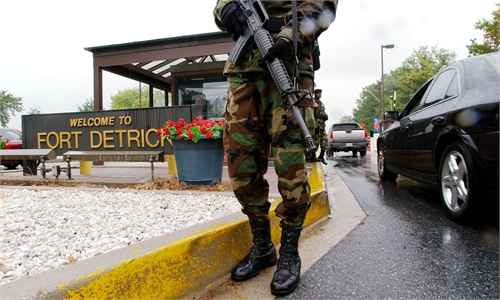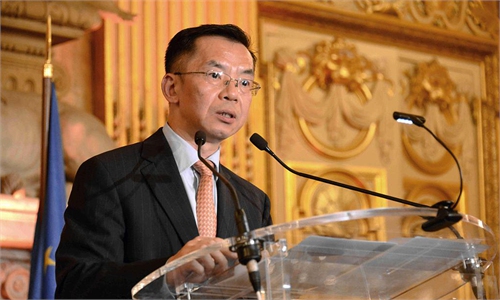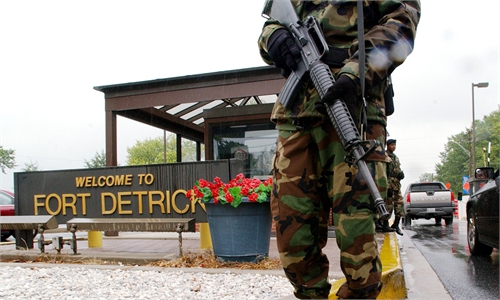Half a million Chinese netizens sign joint letter to the WHO demanding a probe into the US’ Fort Detrick lab
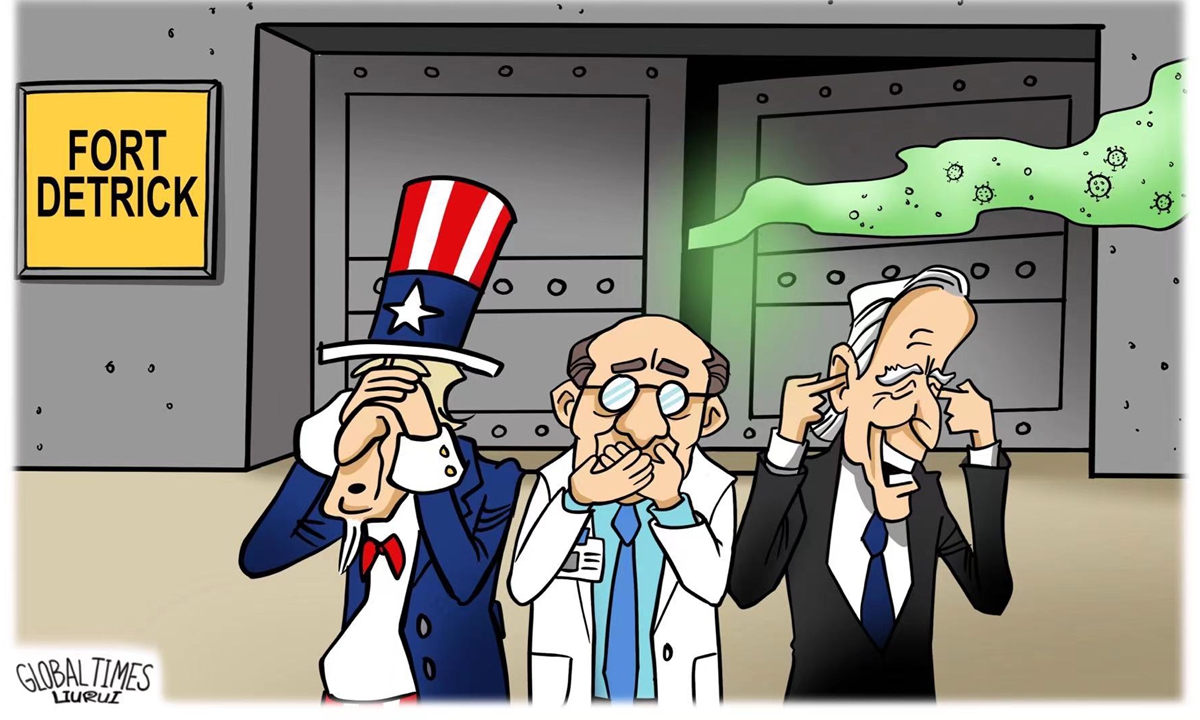
Illustration: Liu Rui/GT
More than half a million Chinese netizens have signed a joint letter to the WHO as of the press time on Sunday, demanding the organization conduct an investigation into the US' Fort Detrick lab, a place whose sudden shutdown is still shrouded in secrecy which has not been subject to any scrutiny from the international community. They believe a thorough probe into the US lab could prevent a future epidemic.
The move came as certain Western politicians and media stirred up a new round of the smear campaign of pinpointing China as the culprit for the coronavirus origin.
A group of Chinese netizens drafted the joint open letter to ask the WHO to investigate the US Army Medical Research Institute of Infectious Diseases (USAMRIID) at Fort Detrick, Maryland. They entrusted the Global Times with posting the letter on its WeChat and Weibo platforms on Saturday to solicit a public response. It has garnered half a million signatures within 24 hours.
They said in the letter that to prevent the next epidemic, the WHO should pay special attention to labs that are conducting studies on dangerous virus or even on biochemical weapons.
The open letter particularly noted the Fort Detrick lab, which stores the most deadly and infectious viruses in the world, including Ebola, smallpox, SARS, MERS and the novel coronavirus. The leak of any of them would cause severe danger to the world.
"But this lab has a notorious record on lab security. There have been scandals of anthrax bacterium from the lab being stolen, causing poisoning to many and even death. There has been a leakage incident in the lab in the autumn of 2019 right before the outbreak of the COVID-19 epidemic, however, detailed information had been withheld by the US under excuses of national security," said the letter.
The information unveiled by the US media has worried the world and some have questioned whether the novel coronavirus could be linked to the US lab.
The USAMRIID was temporarily shut down in 2019 after a US Centers for Disease Control and Prevention (CDC) inspection. Although this mysterious lab reported the reason for the closure as "ongoing infrastructure issues with wastewater decontamination," the explanation was not persuasive enough.
In a recent example in June, a research study run by the National Institutes of Health's All of Us Research Program found evidence of COVID-19 infections in the US as early as December 2019, weeks before the first documented infection in the country.
Wuhan recorded China's earliest COVID-19 symptoms from a patient on December 8, 2019.
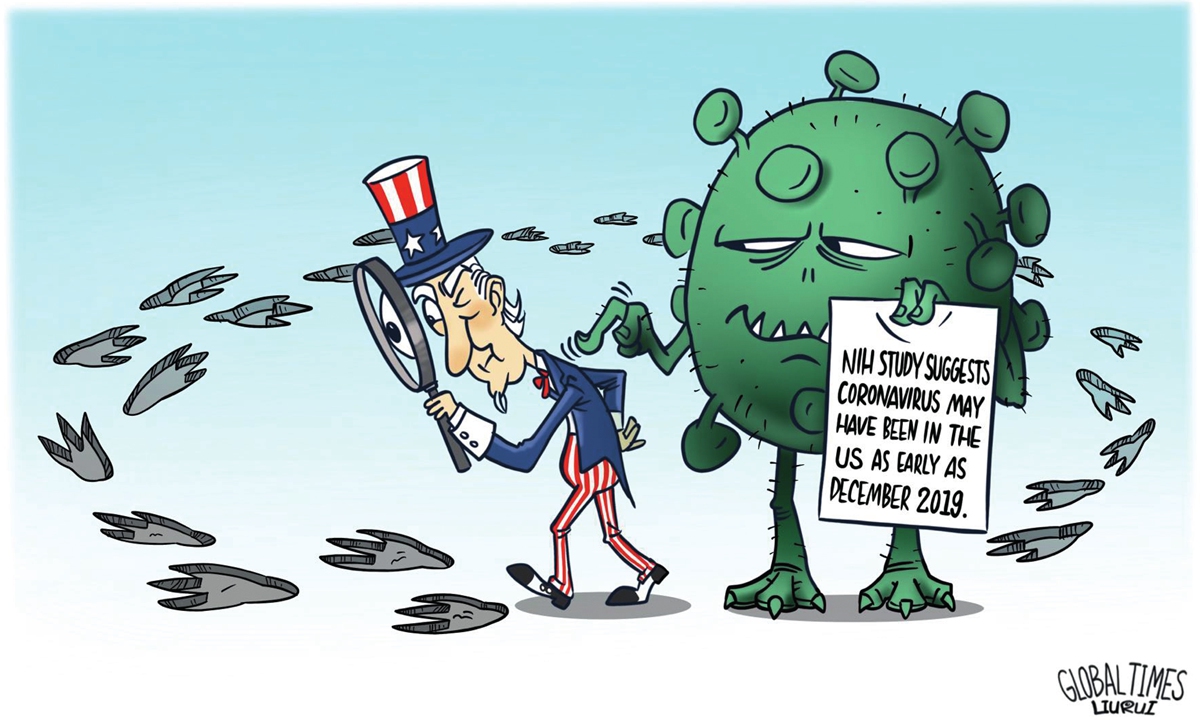
Illustration: Liu Rui/GT
Secret Fort Detrick lab
The joint letter said that "What is more perplexing is that, when China allowed virologists from Western countries and even US mainstream media to visit the Wuhan Institute of Virology, the US has not opened the Fort Detrick lab, let alone shared the original data with countries including China that are independent from US geopolitical influence."
The US even purposely neglected and distorted the Chinese people's call to investigate the Fort Detrick lab - referring to the questions raised in the letter as a "conspiracy theory," and at the same time, used untenable and flawed rumors to attack the Wuhan Institute of Virology, said the open letter.
Zeng Guang, former chief epidemiologist of the Chinese Center for Disease Control and Prevention, told the Global Times that the WHO experts had already made their evaluation about the "Wuhan lab leak theory" during their trip to China, thus suspicion about this hypothesis should be stamped out. However, questions remain for other labs over whether the virus was leaked from them, said the epidemiologist, urging further investigation into labs in other countries.
He believed that the US should be prioritized in the next-stage investigation, as the country was slow to test people at an early stage. The US also has many biological laboratories all around the world. "All bio-weapons related subjects that the country possesses should be placed under scrutiny," Zeng said.
The open letter noted that only by figuring out the origins of the virus can the world eliminate potential hazards, avoid the next round of epidemic and comfort the families of the dead who are seeking answers.
However, the US has always been interrupting the work and refusing to allow the international community to investigate the Fort Detrick lab. After its disastrous handling of the epidemic that has cost the lives of more than 600,000 Americans, does the US want to draw the whole world to be buried with it, asked the open letter.
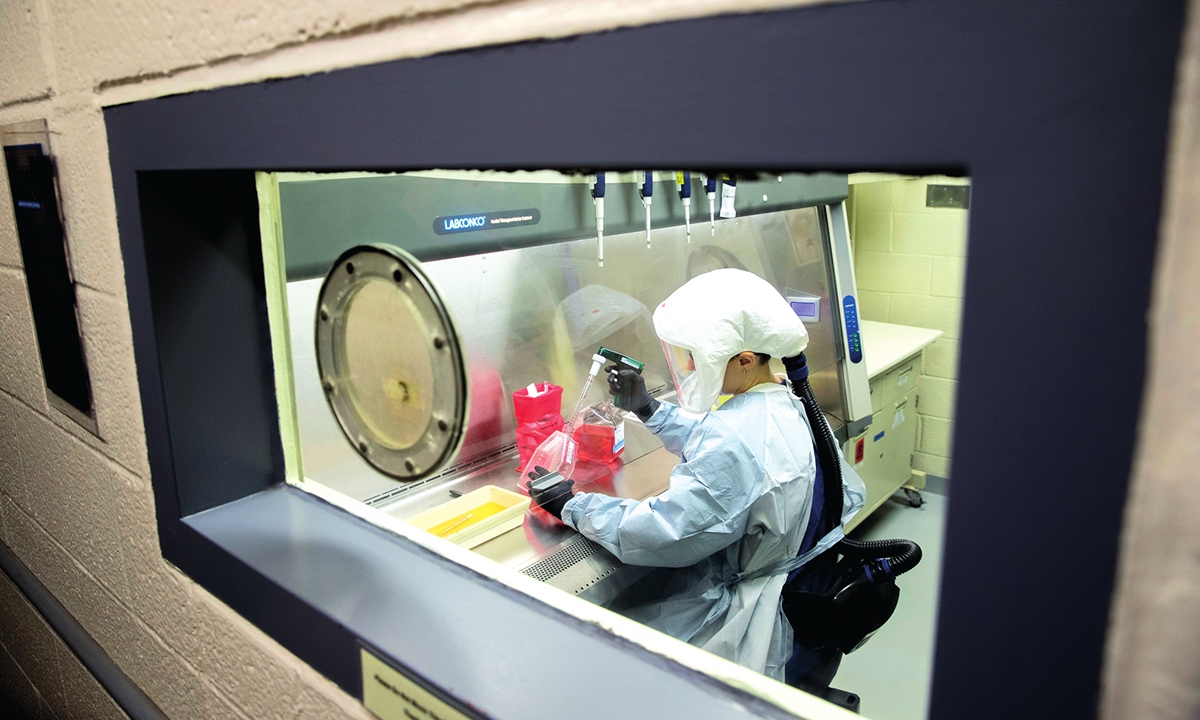
In this March 19, 2020, file photo laboratory scientist Andrea Luquette cultures coronavirus to prepare for testing at U.S. Army Medical Research and Development Command at Fort Detrick in Frederick, Md., where scientists are working to help develop solutions to prevent, detect and treat the coronavirus. Photo: AP
New wave of conspiracy
A new wave of politicizing the coronavirus origins probe was stirred up after WHO Director General Tedros Adhanom Ghebreyesus proposed in a closed-door briefing to member states on Friday a second stage of an investigation into the origins of coronavirus should include further studies in China and lab "audits."
The Director General listed five priorities, which include "audits of relevant laboratories and research institutions operating in the area of the initial human cases identified in December 2019," Reuters reported, citing a copy of his opening statement provided by WHO.
The WHO already dispatched an international expert team to China in January for relevant work. The team members were those carefully selected by the WHO from Western countries covering different areas and they spent almost a month doing field studies in Wuhan before coming up with a scientific conclusion with a detailed report, a Chinese expert close to the WHO-China joint team told the Global Times.
As head of the WHO, Ghebreyesus does not respect the conclusion made by the WHO experts and does not support the suggestion from them on the next phase of the global study, and he even brought up ideas contradictory to the conclusion, which is hard to accept, he said.
"I don't understand why he did it, and as the director-general of the organization, he does not even believe nor support the expert team his own organization dispatched," he said, noting that with a presupposed attitude, it would be pointless to send more people to China again.
Another Western scientist who is close to the WHO-China joint team told the Global Times that the reason Ghebreyesus is setting up to change the approach to phase two is because of political pressure regarding the lab leak from a small number of member states, led by the US.
The Western scientist said that this may lead to a significant delay in starting the next stage investigation, which would be a problem because it could reduce the opportunity to find evidence of the origin. The China team and the WHO international experts were sharing new information about the report and drafting phase two plans. The WHO Director General's proposed changes to the way this work would be done means that the effort is now stalled, he said.
In response to Ghebreyesus' remarks, Chinese Foreign Ministry Zhao Lijian said at Friday's media briefing that international experts from the China-WHO study group on the COVID-19 origins said many times that they accessed substantive data and information and fully understood that some information could not be copied or taken out of China due to privacy.
Zhao said that China is studying the proposals for a phase 2 study, and the next phase study should be led by member states, agreed through consultation and based on the China-WHO joint study report, which concluded that the lab leak hypothesis is extremely unlikely, and that we should look for possible early cases of the outbreak more widely around the world and further understand the role of cold chains and frozen food.
A total of 48 countries have sent letters to the WHO opposing the politicization of the probe on the origins of the virus, urging the organization to act according to the resolution made by the World Health Assembly (WHA) and push forward the global probe on the tracing of the virus, the Chinese Foreign Ministry spokesperson said on Thursday, stressing it shows that objective and fair justice still accounts for the majority.
It pointed out that the WHO-China joint report on the virus origins should serve as foundation and guideline for global virus-origins tracing. The letter pointed out that the probe on the origins of the virus is a scientific work and requires scientists to work in global scope, according to China's Foreign Ministry spokesperson.
Chinese epidemiologists said that the trend of politicalizing virus-tracing issues is standing in the way of a "scientific and rational" investigation of the puzzle. Scientists worldwide should stand together to work on this issue, as well as hobble those who want to squeeze on this topic for their own purposes, those epidemiologists said.


